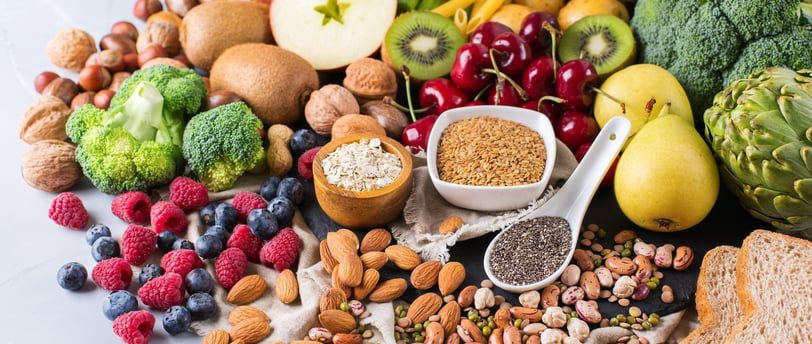Exclusive discounts on starter bundles today!
Top Foods to Eat While on GLP-1 Medications
GLP-1 medications have become a game-changer for managing type 2 diabetes and achieving sustainable weight loss. However, the medication alone is not a magic solution — your diet plays a critical role in maximising its benefits and supporting long-term health.
NUTRITION & MEAL IDEAS
2 min read


GLP-1 medications have become a game-changer for managing type 2 diabetes and achieving sustainable weight loss. However, the medication alone is not a magic solution — your diet plays a critical role in maximising its benefits and supporting long-term health. This article explores the best foods to eat while on GLP-1s, emphasising a balanced, sustainable approach to nutrition that enhances the medication’s effectiveness and sets the stage for lifelong health improvements.
The Importance of a Long-Term Healthy Diet
Adopting a diet that supports your health long-term is essential while using GLP-1 medications. Weight loss achieved through GLP-1s can be maintained only if healthy habits are established. Cheat meals or highly restrictive diets can undermine progress, especially if these behaviours aren’t sustainable once the medication is discontinued. A balanced diet rich in whole, nutrient-dense foods will not only complement the medication’s effects but also foster lasting metabolic health.
Key Dietary Principles
1. Prioritise Protein
Protein is a cornerstone of a healthy diet while on GLP-1 medications. It helps maintain muscle mass during weight loss and promotes satiety. Aim for at least 1.2–1.6 grams of protein per kilogram of body weight daily. Include protein-rich foods like:
Lean Meats: Chicken breast, turkey, lean beef
Fish and Seafood: Salmon, tuna, shrimp
Plant-Based Options: Lentils, chickpeas, tofu, tempeh
Dairy Products: Greek yogurt, cottage cheese
Eggs: A versatile and nutrient-packed option
2. Boost Fibre Intake
Fibre is essential for gut health, blood sugar regulation and feeling full after meals. Aim for at least 30 grams of fibre daily. Excellent sources of fibre include:
Vegetables: Broccoli, spinach, Brussels sprouts, carrots
Fruits: Berries, apples, pears, oranges
Whole Grains: Oats, quinoa, barley, whole-grain bread
Legumes: Black beans, kidney beans, lentils
Nuts and Seeds: Chia seeds, flaxseeds, almonds, walnuts
3. Embrace Balanced Carbohydrates
While low-carb diets are popular, they may cause carb resistance over time, making it harder for your body to process carbohydrates effectively. Instead, aim for 70–150 grams of carbohydrates per day, focusing on complex, slow-digesting sources such as:
Sweet potatoes
Brown rice
Whole-grain pasta
Legumes
Fruits like bananas and berries
4. Avoid High-Fat Diets
High-fat diets can increase the risk of gallstones, a known side effect of GLP-1 medications. To reduce this risk, moderate your fat intake and prioritise healthy fats from sources like:
Avocado
Olive oil
Fatty fish (in moderation)
Nuts and seeds
Avoid excessive consumption of saturated fats from fried foods, processed snacks and fatty cuts of meat.
Foods to Incorporate Daily
Here is a sample list of nutrient-rich foods to include in your daily diet:
Breakfast: Oatmeal topped with chia seeds, berries and a dollop of Greek yogurt
Lunch: Grilled chicken salad with spinach, quinoa, avocado and a light olive oil dressing
Snack: A small handful of almonds and an apple
Dinner: Baked salmon with roasted sweet potatoes and steamed broccoli
Habits to Avoid
Cheat Meals: Frequent indulgences in unhealthy foods can derail progress and make it harder to maintain weight loss post-medication. Focus on finding healthier alternatives to your favourite treats.
Overeating Fat: High-fat diets can contribute to gallstone formation, a risk associated with GLP-1 medications.
Extremely Low-Carb Diets: Avoid overly restrictive carbohydrate intake, as it can lead to carb resistance and hinder long-term metabolic health.
Hydration and Meal Timing
Stay Hydrated: Proper hydration is crucial for overall health and can help manage some side effects of GLP-1 medications, such as constipation.
Regular Meals: Eat balanced meals at consistent times to support stable blood sugar levels and maximise satiety.
A thoughtful, balanced diet is essential for maximising the benefits of GLP-1 medications and achieving sustainable weight loss. By prioritising protein, fibre and complex carbohydrates while avoiding high-fat and overly restrictive diets, you can create a nutrition plan that supports your health now and in the future. Remember, GLP-1s are a tool, but the long-term success of your health journey relies on building habits that last a lifetime.